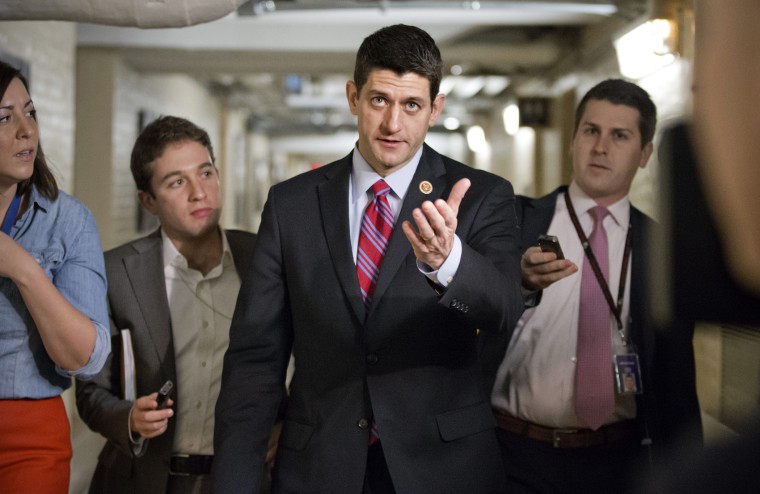House Budget Committee Chairman Paul Ryan (R-Wis.) has been pretty aggressive in recent months about leaking word of his recent policy focus
on poverty. The far-right congressman has periodically let major
news outlets know he now hopes to "help" those who would suffer most under his own budget plan: low-income families.
And so, as Ned Resnikoff
reported, it didn't come as much of a surprise when Ryan yesterday issued a 204-page
report, called "The War on Poverty: 50 Years Later," condemning a variety of federal efforts to reduce poverty in the United States. It's apparently intended to serve as a precursor to the congressman's next budget blueprint, which, predictably, will seek more cuts to Medicaid, Head Start, and food stamps.
Ryan will justify his efforts, working from the assumption that many federal programs, aimed at helping those struggling, unintentionally make matters "worse."
The editorial board of the
New York Times did a nice job summarizing the degree to which Ryan's ideas are "
small and tired."
It's easy to find flaws or waste in any government program, but the proper response is to fix those flaws, not throw entire programs away as Mr. Ryan and his party have repeatedly proposed. It might be possible, for example, to consolidate some of the 20 different low-income housing programs identified in the report, but Congressional Democrats have no reason to negotiate with a party that fundamentally doesn't believe government should play a significant role in reducing poverty. (Similarly, Republicans complain endlessly about flaws in health care reform, but their sole solution is to repeal the entire program, not improve it.) The report notes that some programs, including the earned-income tax credit, have been effective, but it fails to draw the proper lessons from those examples. The most successful programs, including the tax credit, Medicaid and food stamps, have been those that are carefully designed, properly managed and well-financed. For all their glossy reports, Republicans have shown no interest in making these or any other social programs work better.
It's a fair critique, but digging in a little closer, even more glaring issues arise.
The
Fiscal Times' Rob Garver, for example,
interviewed some of the same economists cited in Ryan's paper in support of his thesis. Many of the experts "had reactions ranging from bemusement to anger at Ryan's report, claiming that he either misunderstood or misrepresented their research."
Ryan's paper, for example, cited a study published in December by the Columbia Population Research Center measuring the decline in poverty in the U.S. after the implementation of Lyndon Johnson's "War on Poverty." One of the study's authors, Jane Waldfogel, a professor at Columbia University and a visiting scholar at the Russell Sage Foundation, said she was surprised when she read the paper, because it seemed to arbitrarily chop off data from two of the most successful years of the war on poverty. Waldfogel and her colleagues looked at an alternative measure of the poverty rate known as the Supplemental Poverty Measure (SPM), which factors in government benefits like food stamps and programs like the earned-income tax credit. That alternative measure is thought to present a more accurate and realistic gauge of the poverty and the real-world effects of government programs aimed at combatting it. The Columbia researchers found that, using their model of the SPM, the poverty rate fell from 26 percent in 1967 to 15 percent in 2012. Ryan only cites data from 1969 onward, ignoring a full 36 percent of the decline.
Waldfogel told Garver, "It's technically correct, but it's an odd way to cite the research. In my experience, usually you use all of the available data. There's no justification given. It's unfortunate because it really understates the progress we've made in reducing poverty."
She wasn't the only scholar with concerns. The same article noted a Columbia researcher named Chris Wimer who suggested Ryan used his work in a misleading way when talking about the 1996 welfare-reform law. University of Wisconsin at Madison professor Barbara Wolfe said Ryan's report simply "misstated" her findings on housing assistance and mischaracterized her research on Medicaid.
The Fiscal Times also talked to University of Illinois at Urbana-Champaign's Jeffrey Brown who said Ryan's report also ignored relevant caveats when he highlighted Brown's scholarship on Medicaid.
In the larger context, there are a couple of important angles to keep in mind. The first is that Ryan, no doubt aware of the political environment, doesn't want to be known as the cruel, callous conservative who wants to slash aid to the poor. So what he's done is look for a new way to reframe his own plan: he still supports letting struggling families fend for themselves with a weak, shredded safety net, but the Wisconsin Republican wants Americans to perceive this as compassionate. Ryan wants to effectively show those in poverty "tough love," cutting off benefits that keep their heads above water because he's actually a "
champion of the poor," all evidence to the contrary notwithstanding.
But Ryan also wants to add an intellectual veneer to his plan, so he cites actual scholars who've done extensive research on the policies he's eager to slash. The problem, however, is that Ryan didn't cite them accurately -- more than a few of them seem to think the congressman's report leaves readers with a misleading impression of their work, which effectively defeats the purpose of trying to create an intellectual veneer in the first place.
